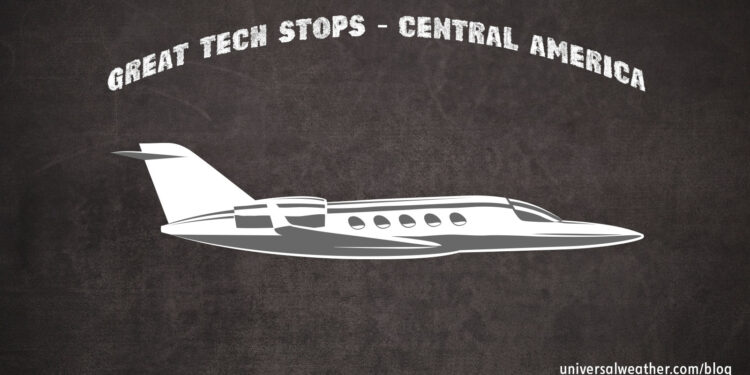5 Great Tech Stops Near Central America for Business Aviation – and Why

This business aviation blog post is part of a series on great technical stops for business aviation.
Central America has excellent tech stops with fast turnarounds and trouble-free procedures for business aircraft operators. Airfields offer 24-hour operations, quick turns and usually do not require Customs, Immigration and Quarantine (CIQ) clearance or visas. An experienced 3rd-party provider can help check notification requirements and options for setting up tech stops with less notice. We recommend avoiding tech stops in Mexico when coming from the south or the Caribbean. Other Central American options will typically be more convenient.
1. What are recommended tech stops within this region?
There are many fantastic locations for tech stops around Central American, and the following are 4 that we highly recommend:
Panama City, Panama (MPTO)
San Jose, Costa Rica (MROC)
Liberia, Costa Rica (MRLB)
San Salvador, El Salvador (MSLP)
Explanation:
Operators can expect great service with tech stops in Panama City, Panama (MPTO), San Jose, Costa Rica (MROC), Liberia, Costa Rica (MRLB), and San Salvador, El Salvador (MSLP). It’s generally preferable to avoid tech stops in Mexico when entering from the south or from the Caribbean region, due to mandated stops at Tapachula, Mexico (MMTP) and Cozumel, Mexico (MMCZ). Specifically, the Mexican government requires that all flights departing from the Caribbean or from countries south of Mexico with Mexico as their destination first stop at one of these airports. Additionally, an operator must also consider landing permit and Mexican insurance requirements when traveling to Mexico.
2. Why are these locations recommended?
While MPTO requires a landing permit, the permit can be arranged relatively quickly, and MPTO is a good airfield with full services. MROC and MRLB don’t require landing permits, and the advance notification required is less than 24 hours. MSLP does not require a landing permit for private non-revenue flights, but charter (non-scheduled commercial) operations do require a landing permit with a four-day lead time. For all these locations, jet fuel pricing is reasonable, there are in-flight catering services available, and ground handling is available 24 hours a day.
3. What is the turnaround time at these locations?
Turnaround times are relatively fast for all of these locations. The time to complete a full stop, including jet fuel uplift, ranges from under an hour to just over an hour.
4. Is CIQ clearance or visas necessary for tech stops at these locations?
You will usually not need to clear CIQ if passengers remain on the aircraft. Visas may be required depending on the nationality, which is something that an experienced 3rd-party provider can help clarify. The ground handler provides notification to customs authorities, but formal clearance usually isn’t required.
5. What are the operating hours for each of these locations?
All the airports mentioned above are open 24 hours a day, except MRLB, which is open 0600-2359 local. Additionally, full services are available 24/7 for all airports, except MRLB, where services are available 0600-2359 local.
6. Are airport slots, Prior Permissions Required (PPRs) or landing permits required?
No airport slots or PPRs are required, but landing permits are needed for tech stops at MPTO for private non-revenue and charter (non-scheduled commercial) flights. The lead time for the Panama Civil Aviation Authority (CAA) to process a landing permit is six days with a minimum of 24 hours. MSLP requires a landing permit for charter (non-scheduled commercial) flights only with the exception of medical evacuation flights. The official lead time for the El Salvador CAA to process a landing permit is four days, but authorities may approve permits sooner at their discretion.
7. Can credit be arranged for all ground handling and other services?
Credit can be arranged for all services at these locations. Aviation fuel cards (also known as fuel carnets) and credit cards are accepted for payment of jet fuel.
8. Are ground handlers fluent in English?
English is not the primary language at any of these locations. However, it is spoken well at all locations, which allows for ease in communication.
9. Is there anything that may complicate the tech stop or cause operational delays?
Providing misinformation can cause delays. Short-notice requests (less than 48 hours) for tech stops at MPTO and MSLP may not be possible due to landing permits required but may be accommodated if the appropriate CAA approves the request. If you decide, while on a tech stop, to extend the stay to a couple of days, this can cause issues. Specifically, revisions to landing permits may be required, CIQ clearance will be needed, visas may be necessary, and aircraft parking may not be available especially during special events.
10. Are there any airports in the region you would not recommend for tech stops?
Some airports in this region are in mountainous terrain. Airports in Honduras have issues with limited airport hours and occasional jet fuel shortages. For Mexico, when arriving from the south or the Caribbean, you must stop at MMTP or MMCZ as mentioned earlier in this post. This can be an unpleasant experience for passengers, as you may be held on the ground for up to two hours and, in some cases, for a longer period of time, if a security search is mandated. If you are selected to be searched, you will be required to shut down all aircraft systems, and all passengers, baggage and aircraft will be inspected by the Mexican army or customs agents. If you have to use these airports, the best thing to do is to inform your passengers beforehand that this is an unavoidable possibility.
Conclusion
Many operators have preferred tech stops for different reasons. For operators that don’t frequent this region, we recommend to look for quick turnarounds, good services and a hassle-free experience. An experienced 3rd-party provider can help evaluate all tech stop options pre-trip. Of you choose the wrong place to tech stop the experience may be trying for both passengers and crew.
Later, we’ll discuss great technical stops for business aviation in Africa.
Have questions, something to add, or just want to tell us you liked this article? Let us know in the comments area below.




